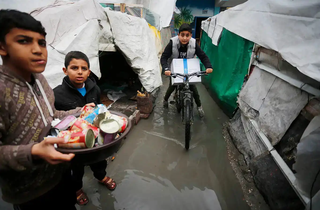The children, who represent about three-quarters of the 3,800 who were receiving life-saving care in southern Gaza before the conflict in Rafah escalated, have been cut off from treatment. The ongoing violence and displacement have severely impacted access to healthcare facilities and services for desperate families.
While there has been a slight improvement in the delivery of food aid to the north, humanitarian access in the south has declined dramatically. Early results from recent malnutrition screenings in the middle and southern governorates of Gaza indicate that cases of moderate and severe malnutrition have risen since the second week of May.
"Horrific images continue to emerge from Gaza of children dying before their families’ eyes due to the continued lack of food, nutrition supplies, and the destruction of healthcare services," said Adele Khodr, UNICEF Regional Director for the Middle East and North Africa.
The risk of rising cases of malnutrition coincides with the collapse of malnutrition treatment services. Currently, only two of the Gaza Strip’s three stabilization centers that treat seriously malnourished children are functioning. Plans for the opening of new centers have been delayed due to ongoing military operations across the Strip.
Treatment for acute malnutrition typically takes six to eight weeks of uninterrupted care and requires special therapeutic food, safe water, and other medical support. Malnourished children are at heightened risk of catching diseases and other health issues due to limited access to safe water, sewage overflow, infrastructure damage, and a lack of hygiene items.
"With hospitals destroyed, treatments stopped and supplies scant, we are poised for more child suffering and deaths," Khodr warned. "Our warnings of mounting child deaths from a preventable combination of malnutrition, dehydration, and disease should have mobilized immediate action to save children’s lives, and yet, this devastation continues." (ILKHA)



 Güncel
Güncel
 Dünya
Dünya
 Dünya
Dünya
 Güncel
Güncel
 Dünya
Dünya
 Dünya
Dünya
 Dünya
Dünya
 Dünya
Dünya
 Güncel
Güncel
 Güncel
Güncel





